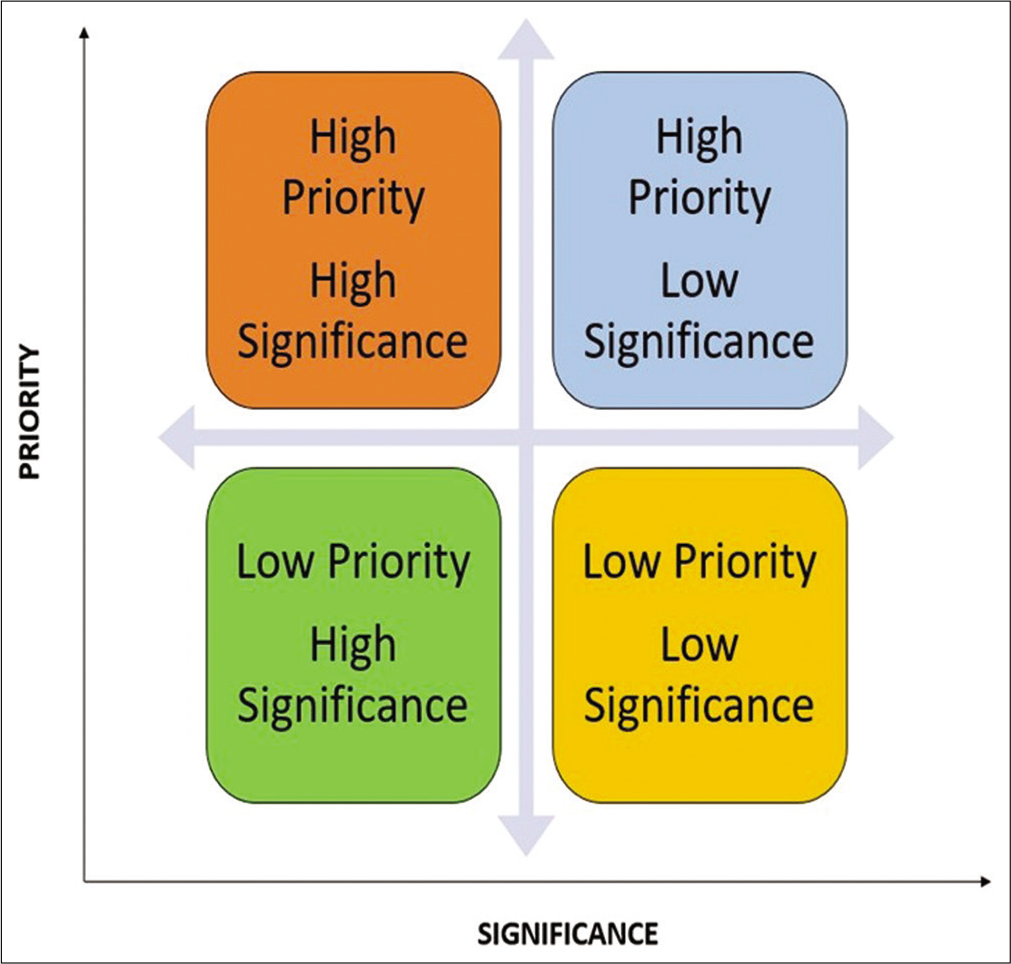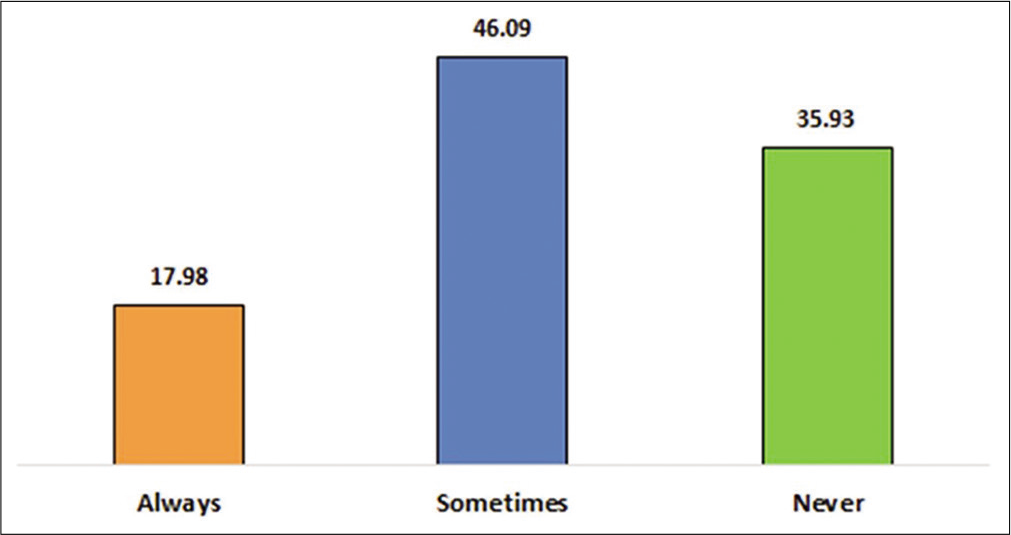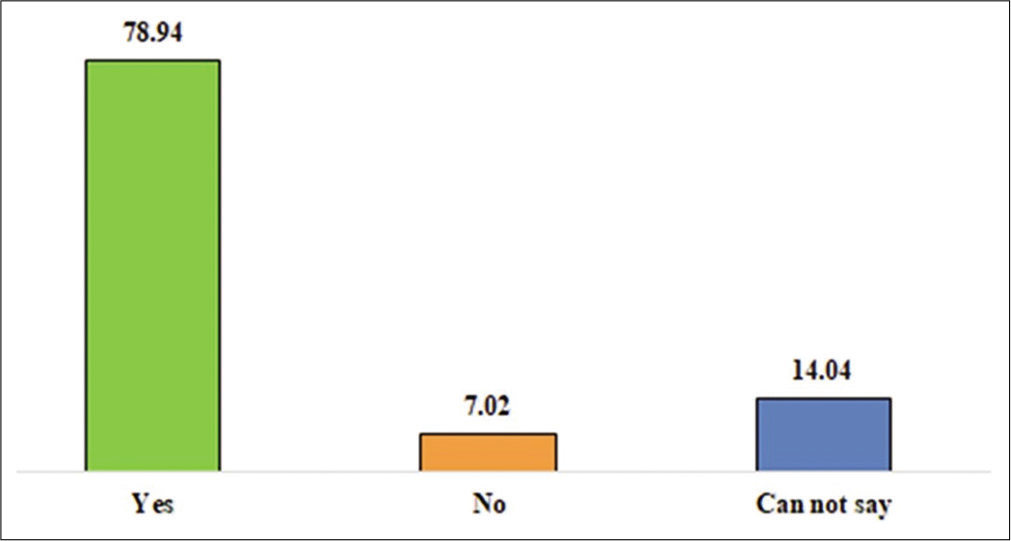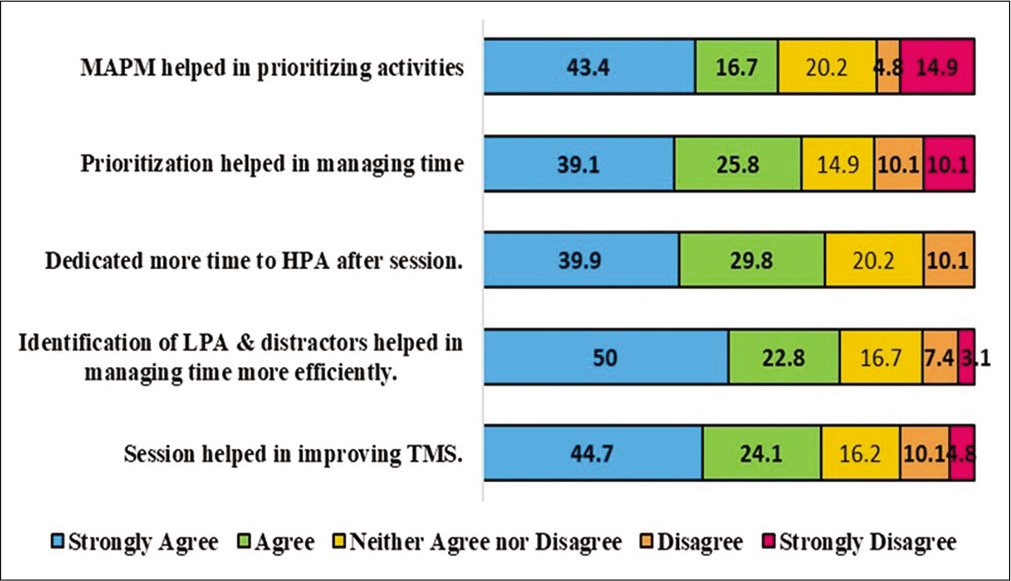Translate this page into:
Time management skills: Early sensitization among first-year medical undergraduates

*Corresponding author: Medha Mathur, Department of Community Medicine, Geetanjali Medical College and Hospital, Udaipur, Rajasthan, India. drmedhamathur@gmail.com
-
Received: ,
Accepted: ,
How to cite this article: Mathur M, Kaur M, Singh H, Mathur N, Verma A, Patyal A. Time management skills: Early sensitization among first-year medical undergraduates. Adesh Univ J Med Sci Res 2021;3(1):41-5.
Abstract
Objectives:
Time management skills (TMSs) in medical undergraduates determine their success and development of clinical competence in the later part of their career. This study was designed for early sensitization of students to TMSs using “Modified Action Priority Matrix.”
Materials and Methods:
First-year medical undergraduates (n = 228) were enrolled in the study, after need assessment for time management, they were engaged in session for TMS development. They were sensitized about the use of a modified action priority matrix (MAPM) for time management.
Results:
On analyzing the results of pre and post-test sessions, significant improvement in students’ performance (P < 0.05) was noted. Reflection of students regarding the MAPM also depicted that this method helped them to manage their time effectively by ordering their activities as low, medium, and high priority ones.
Conclusion:
Skills of time management imparted using MAPM is an effective method and importance of early exposure of TMSs is undoubtedly high.
Keywords
Medical education
Early exposure
curriculum
Medical students
Time table
INTRODUCTION
Time management is defined as planning and control of time to improve efficiency and effectiveness. The importance of time management has been emphasized by academicians and it is considered as one of the most effective methods to achieve a goal. Time management can be achieved successfully by setting realistic goals and organization. The two basic components of organization are organizing stuff and organizing time.[1] Time management is not just “managing” time; rather, it is about setting priorities and planning and implementing these priorities in the available time.[2] Skills of time management are not always inherited personality traits; instead, they can be achieved by learning and practice.
Time management skills (TMSs) are essential for medical students’ success and development of clinical competence.[3] Researches have shown that those students who have optimal skills of time management will manage time more effectively even after graduation in their professional career. This emphasizes the need of TMSs in medical students.[4] Time management has been identified as an important skill by medical educators to enhance the learning capabilities of undergraduate medical students.[5] Poor TMSs may result in stress, anxiety, and underperformance in studies. Several studies have revealed that TMSs are associated with academic performance.[6] TMSs are not only the skills of saving “time” but also to make the most out of it.[7] These skills also help in the transition of a medical student to a physician when he realizes that his time is no more his own, at such a point, TMS awareness may be savior.[8,9]
Time management requires understanding regarding a blend of structured and unstructured time-consuming tasks followed by fragmenting them according to priorities and then managing them systematically.[10]
There is a lack of standard methods to impart the skills of time management to students; rather this skill is learned by observing the seniors or others whom students idealize. In Foundation Course for the Undergraduate Medical Education Program (2019), recently introduced in the newer undergraduate curriculum in India, a session on time management has been made mandatory under “Professional Development and Ethics,”[7,11] which is the first step in the arena of “Time Management skill” teaching to medical students. “Modified Action Priority Matrix” (MAPM), an innovative tool can be used among undergraduates at an initial level of their teaching to acquaint them with the art of time management in a scientific manner. This study was designed to sensitize the students with the concept of time management at an early stage of their academic career and to evaluate the impact of TMS teaching using MAPM and to take feedback and reflection on the same by 1st-year undergraduates of Geetanjali Medical College and Hospital, Udaipur, Rajasthan, India.
MATERIALS AND METHODS
This educational interventional study was conducted for 3 months of duration (December 2019 to February 2020) under the Medical Education Unit of Geetanjali Medical College and Hospital, Udaipur. The study was conducted among 1st-year MBBS students’ of the 2019 batch. Institute has a yearly intake of 250 students and those volunteer students of batch 2019 who were present on the day of data collection were enrolled for the study after taking informed consent.
Need assessment of TMS teaching was conducted beforehand by focused group discussion of 12 volunteer students and live online voting of all students (n = 228) using free online software 2020. Mentimeter was also conducted among participants for the same purpose.
Followed by “need assessment,” pre-test was conducted using a pre-designed and pre-validated time management questionnaire to assess students regarding their TMSs (Wayne State University, 2013).
The questionnaire consist of 25 statements related to the current time management proficiency of students and responses were recorded by Likert scale on a range from “0” to “2” where zero stood for “never,” 1 for “sometimes,” and 2 for “always.” Score of 0–30 suggested that TMSs of the respondent should be improved, score of 30–45 suggested TMSs were fairly well and can be improved, and a score of more than 45 suggested that TMSs of respondent were excellent.
After the pre-test, students were taught about the TMSs using interactive lecture, group activities, buzz sessions, and MAPM exercise. Students were explained about filling MAPM on a daily basis for a 1-month duration for learning the skill of time management using high priority activities (HPA), medium priority activities (MPA), and low priority activities (LPA) as references. Examples of HPA included exam or revision planning, preparation for next day, etc., MPA were deadlines for the following week/month, more long-term projects, research/preparation for medium-term work, and LPA were rewriting lecture notes, so they are neat or redrawing diagrams until they are perfect; browsing the Internet with no specific search objectives; all projects with no deadlines; interruptions by phone, email, or callers.
A model MAPM was prepared by authors which had ideal activities as per priority and significance for the students. It was shown and explained to students in the form of a matrix. Horizontal axis of the matrix indicates “significance” while the vertical axis consists of “priority” of those activities [Figure 1]. Students were asked to generate their own action priority matrix after deciding their own priorities. At the end of the session, a worksheet based on the MAPM was shared with the students and they were instructed to submit their MAPM online (through email) on a weekly basis to the investigator. Feedback was recorded for the session by peer-reviewed questionnaire through a 5-point Likert scale with “1” as strongly disagree and ranging to “5” as strongly agree. Reflections were collected from students regarding the intervention session and experience of students with MAPM after 1 month of duration. Students were sensitized about writing reflections then only they were asked to write reflections. One month later, post-test was conducted for assessing improvement in TMSs of students using the same questionnaire as pre-test.

- Modified action priority matrix.
Participation in the study was voluntary and written informed consent was obtained from the participants before the study. The Ethics Committee of the Institute approved the study proposal (GU/HREC/2019/1704).
Collected data were analyzed using Statistical Package for the Social Sciences Statistics for Windows, version 24 (IBM Corp., Armonk, N.Y., USA) and thematic analysis of qualitative data was conducted. Set of themes and codes based on prior knowledge of the authors was established. Then based on this coding, the reflections of students were analyzed. For each reflection, key sentences were identified and the interpretations of these were then organized into clusters of themes in Microsoft Excel.
RESULTS
The first-year MBBS batch of 2019 had 250 students, only 228 volunteer students were enrolled for the study as 22 students were not present on the day of pre-test and intervention.
Out of 228 students, 100 (43.86%) were males and 128 (56.14%) were females. Need assessment session of students regarding TMSs suggested that 17.98% (41) students “always” missed their deadlines, 46.09% (105) “sometimes” missed their deadlines while only 35.93% (82) students “never” missed their deadlines, in response to their tendency of missing deadlines for any assignment submission in college [Figure 2]. In response to the habit of procrastination of studies till last hour, students responded that 53.94% (123) students sometimes do so, 22.36% (51) never did so, and 23.68% (54) had a habit of procrastination of studies till last hour.

- Response of students regarding their tendency of missing deadlines in assignment submission (n = 228).
On asking the students regarding their felt need for time management, 78.94% (180) of students stated that they feel the need for “time management skills” while 14.04% (32) were not sure about the need and 7.02% (16) felt that they are managing their time in a systematic manner, but still improvement is needed [Figure 3].

- Felt need of time management skills by students (n = 228).
In the focus group, discussion students were very enthusiastic about learning the skills of time management. Some of the verbatims of the students are: “Sometimes I feel that I have wasted so much time on useless activities and important things like studies get very less time; maybe some method to organize my time could be useful.” “I plan my day every morning but by the end of the day I realize that things are not going as per planning and I get stressed due to that.” “Watching television and surfing the internet is the biggest waste of time for me. Maybe I am addicted to the internet, need to change my habit.”
On analysing pre- and post-test results of 228 students, it was found that mean (± standard deviation) value of pre-test was 28.96(±5.86) and post-test was 34.18(±5.58). On applying paired student t-test (9.74), P < 0.001 which implies that the TMSs improved among students significantly after session as compared to previous performance.
Feedback by students regarding the teaching of TMSs depicted that 43.4% (99) students strongly agreed to the fact that MAPM helped them in prioritizing their activities, whereas 16.7% (38) agreed, 20.2% (46) neither agree nor disagree, and 19.7% (45) disagreed with this statement. Nearly 65% (148) students agreed that prioritization helped them to manage their time more efficiently, while 20.2% (46) disagreed. About 39.9% (91) of participants strongly agreed, 29.8% (68) agreed, and 10.1% (23) disagreed that after the session, they were able to dedicate more time to HPA. About 50% (114) respondents strongly agreed, 22.8% (52) agreed that identification of LPA and distractors proved to be effective in time management. Overall impression of the session in improving TMSs was found helpful by most (44.7% strongly agree; 24.1% agree) of the students [Figure 4].

- Feedback of students (n = 228). TMS: Time management skills, LPA: Low priority activities, HPA: High priority activities, MAPM: Modified action priority matrix.
Students were asked to write reflections at the end of the session. Several themes emerged during analysis and these were categorized in key codes. Themes were listed as subheadings by the sides of illustrative verbatim of the students in their reflections and were classified under the codes, namely “Improvement,” “Prioritization,” and “Wastage of time.”
Improvement
Several students mentioned that their TMSs improved after planning their weeks using MAPM and one verbatim stated that “The session on time management was really useful and in the last one month I felt the improvement. I started preparing and following a weekly schedule which helped me in keeping track of my time and activities.” Many participants mentioned “improvement in time management skills.”
Prioritization
The issue of prioritization of activities markedly improved after the use of MPAM by the students as mentioned “By using the Modified Action Priority Matrix I can prioritize my activities and session helped me in developing a habit of not procrastinating the important tasks.” The habit of “delaying tasks or procrastination” was one of the major concerns of students, which was improved.
Wastage of time
The students mentioned that time management helped them to reduce the wastage of time significantly. As clearly stated, “After the class, I have decided to use these time management techniques to avoid wastage of time and I’ll put honest effort to complete my assignments on time.”
A model “Modified Action Priority Matrix” has been summarized in [Table 1]. Students submitted their MAPM on a weekly basis and by this activity, they ordered their high, medium, and low priority tasks and time required for those activities. This exercise helped them to quantify the appropriate amount of time for corresponding activities.
| Week I: Day 1–7 | |||
|---|---|---|---|
| Day | 8 AM to 1 PM | 1 PM to 6 PM | 6 PM to 11 PM |
| Monday | Lectures/Dissection class | Tutorials/SDL | Home study/Watching television/Family time |
| Tuesday | Lectures/Demonstration Class | Tutorials/SDL | Exercise/Home study/Watching Web series |
| Wednesday | Lectures/ Dissection class | Tutorials/SDL | Outing with family and dinner |
| Thursday | Lectures/Demonstration Class | Tutorials/SDL | Exercise/Home study/Watching Web series |
| Friday | Lectures/ Dissection class | Tutorials/SDL | Movie and party with friends |
| Saturday | Lectures/Demonstration Class | Tutorials/SDL | Exercise/Internet surfing |
| Sunday | Gardening/Cooking tutorials | Sleeping | Preparing for next week |
DISCUSSION
The sessions on TMSs provided an opportunity to the students for enhancing their time management more effectively. Literature has suggested that improved TMSs contribute to lesser burnouts, better patient-physician relations, and higher career satisfaction. Having sufficient evidence in support of the above said statements, it is always beneficial to inculcate the habit and skills of time management in our students at an early stage, like at the entry point in the medical institution.[12,13] Focusing on the objectives, this interventional educational study was conducted to assess the impact of imparting TMSs using the MAPM among 1st-year undergraduate medical students and the results reflect that participants improved statistically. Need assessment sessions showed that the TMSs were longed by students and they showed similar responses in reflections after sessions using MAPM. In our study, 78.94% students admitted that they perceive a need for time management, while a study conducted on medical students in Saudi Arabia reported that 54% students were not able to manage their time,[14] the difference in the proportion of students could be due to different data collection tools used in both the studies. In a study where participants were nursing students, it was found that time management was observed in 85.5% students which may be due to more emphasis in nursing training institutes on time management.[15] These findings were in contrast with the findings of the study on nursing students (49%).[3] The feedback of students was found to be ranging from neutral to positive responses for the sessions and impact of MAPM on their TMSs. Few studies conducted on TMSs were in consensus to our study where a moderate number of students need TMSs while few showed good TMSs.[3,4,16] After the session, students were of opinion that time management is an important skill for their control over their time and it definitely reduces stress and unorganized studies. TMS development at an early stage in medical students will evolve as a habit of good time managerial skills. The impact of the session could be a short-term improvement as a longer duration of the assessment is required to comment on long-lasting influence. Hence, this study has concluded that prioritization of activities under high, medium, and low priority tasks help in delegating time rationally and this can be easily done using MAPM. The use of matrix has some constraints initially, but with practice, it becomes a part of the routine and helps in managing time more efficiently which leads to better utilization/management of time. Imparting TMS at an early stage of a medical career is expected to have better outcomes as a physician.
Limitations of the study: Due to resource constraints, the study focused only on the short-term effect of MAPM on time management. To understand the long-term effects of this method, extended forms of similar study can be conducted in the future.
Declaration of patient consent
Institutional Review Board (IRB) permission obtained for the study.
Financial support and sponsorship
Nil.
Conflicts of interest
There are no conflicts of interest.
References
- Time management: A realistic approach. J Am Coll Radiol. 2009;6:434-6.
- [CrossRef] [PubMed] [Google Scholar]
- Managing self for leadership. Indian J Community Med. 2020;3:138-42.
- [CrossRef] [PubMed] [Google Scholar]
- Relationship between time management skills and anxiety and academic motivation of nursing students in Tehran. Electron Physician. 2017;9:3678-84.
- [CrossRef] [PubMed] [Google Scholar]
- Time management and its relation to students' stress, gender and academic achievement among sample of students at al ain university of science and technology, UAE. Int J Bus Soc Res. 2014;4:47-58.
- [Google Scholar]
- Effects of time-management practices on college grades. J Educ Psychol. 1991;83:405-10.
- [CrossRef] [Google Scholar]
- College students' academic stress and its relation to their anxiety, time management, and leisure satisfaction. Am J Health Stud. 2000;16:41-51.
- [Google Scholar]
- Tricks of the trade: Time management tips for newly qualified doctors. Postgrad Med J. 2018;94:159-61.
- [CrossRef] [PubMed] [Google Scholar]
- Assessment of time management skills: Psychometric properties of the Swedish version. Scand J Occup Ther. 2018;25:153-61.
- [CrossRef] [PubMed] [Google Scholar]
- Foundation Course for the Undergraduate Medical Education Program India: Medical Council of India; 2019. p. :1-46.
- [Google Scholar]
- Burnout and satisfaction with work-life balance among US physicians relative to the general US population. Arch Intern Med. 2012;172:1377-85.
- [CrossRef] [PubMed] [Google Scholar]
- Relationship between clerical burden and characteristics of the electronic environment with physician burnout and professional satisfaction. Mayo Clin Proc. 2016;91:836-48.
- [CrossRef] [PubMed] [Google Scholar]
- Is time management related to better academic performance and perceived academic satisfaction among medical students? A cross-sectional survey in Saudi Arabia. Int J Adv Res. 2016;5:2205-13.
- [CrossRef] [Google Scholar]
- The effect of time management skills and self esteem of students on their grade point averages (GPA) IOSR J Nurs Health Sci. 2015;4:82-8.
- [Google Scholar]
- Examination of the relation between academic procrastination and time management skills of undergraduate students in terms of some variables. J Educ Train Stud. 2016;4:76-84.
- [CrossRef] [Google Scholar]







